Giving Quality of Life for a terminally ill loved one.

When you find out that someone you love is terminally ill, everyone re-acts differently and many people are unsure of what to say or how to be with their loved one. Often the necessary things that someone terminally ill might want to do, get missed due to this. Here are some helpful tips from personal experience to consider should this occur in one of your loved ones lives.
The people closest to the loved one often avoid talking or asking about their hopes and dreams and what they would like to achieve in the time they have left. This could simply be because they do not know how to ask what the person desires for fear of upsetting or hurting them.
From recent personal experience of caring for my 38 year old son Leon, who died 9 months and 2 days after he lost his own 8 month old baby daughter Krystal, this is what I learned about helping him be independent and enjoy whatever he could in their time. Leon was diagnosed with pancreatic cancer on 1st August 2007, 4th stage, his only symptoms being an excrutiating back pain for some 7 weeks prior to this. Krystal died on 27th March 2007 after complications set in during a 5 week battle to live after open heart surgery.
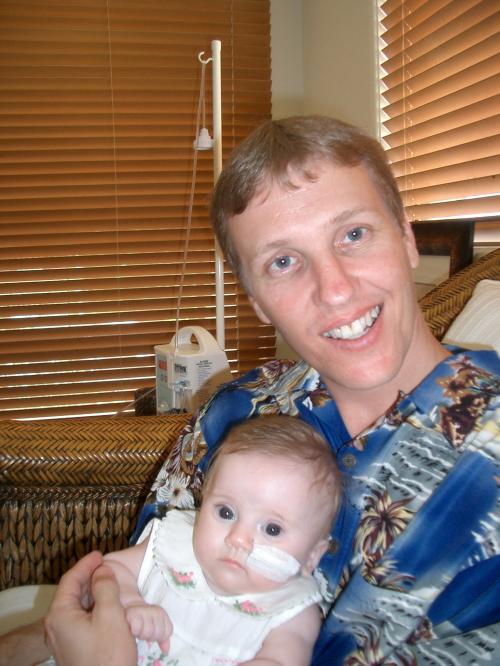
If the loved one is an adult, they need to know that they have choices as to how or where they will be cared for up to their death. Is home palliative care something you can offer, be you mother, father, sibling or partner?
This is a big job and very emotional primarily for the carer, however it is the most rewarding one for both patient and also the carer or carers Ultimately it means that you can offer a private place for the expression of emotions, fear, and grief of everybody involved. And both loved one and supporting family retain some sense of normality in their day to day living.
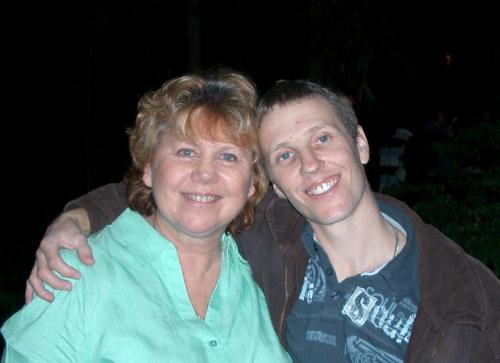
The hardest task of all, but the most imperative to be faced as early as possible (because even a prognosis of weeks, can either diminish or expand without warning) is to arrange an Enduring Power of Attorney (and one that covers their Medical treatment) and of course a Will. In our experience this was probably the hardest thing to do but the one that was the most urgent to complete, even though it effectively gives the loved one an initial sense of despair. Once it was done though, a sense of relief comes to the loved one and the supporting family.
Source forms of income for the loved one, who undoubtably is no longer working and may not have any savings as was the case for my son. Disability pension is paramount in this situation of course, and often trying to arrange this stresses the patient big time. Even though its just a minimal sum, its imperative to organise just so that some money comes in to help with medical expense.
Superannuation is also an option to consider as in Australia most policies have a terminal illness component, which will allow you to convert the death benefit and super savings into a Investment fund where they can draw down a tax free proportion of it so the patient has access to funds to give them some freedom of choice and fulfil experiences they may yet want to do. That way the loved one may have some extra tax free and unencumbered money to spend and the balance is kept for their estate.
In Australia we have a carer's allowance and a carer's pension. The pension is based on the family income of the carer and their partner, so often this is not an option to take up, however the carer's allowance is not income assessed and whilst only a small amount, can make a difference in purchasing sundry items related to the care of the patient, or for the carer's own personal use.
Now that we have the formalities out of the way, lets discuss the quality of life of both the loved one and the supporting family and friends.
Home palliative care offers freedoms unlikely to ever be able to be experienced in a hospital environment, both for the loved one and the supporting family structure. Eg.
- Family and friends can call in at any time of the day to visit.
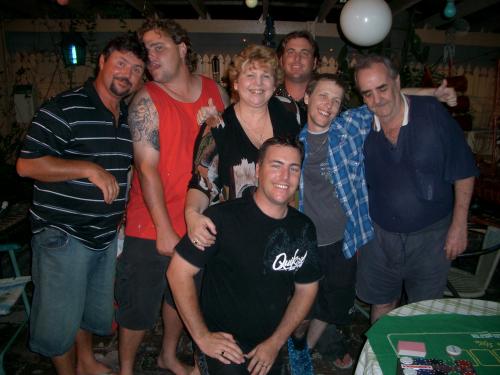
Leon's with mum, and 4 of his brothers, and dad.
- You can have get togethers when it suits all parties - this is an important part of the support process and care, as it helps all associated family and friends of the patient to know that they have some quality time together. Of course there are days when the ill loved one is not feeling on top of things and may be depressed or not conducive to a get together, this is normal and should be paced out appropriately. At other times, the mere presence of people that care enlivens the loved one to draw on deep resources and fight the discomfort and tiredness they may feel, and an enjoyable time can be experienced by them.
- You can set up the home environment to cater for whatever quality of life and enjoyment that you can offer for the patient and also for the supporting family/friends. Outside & indoor entertainment areas if at all possible.
- Separate TV viewing, game playing area for their personal independence, while they are able, and catering to visitors with seating and or table and chairs.

Leon on his chaise lounge in our rumpus room which we turned into his independent entertainment space and visitor area.
- Knowing that you respect their privacy while they have independence is very important to your loved one, and if they are able to drive, allow them every independent action they choose, because the fact is that they know that you are at home waiting to be and do for them, and that gives them security.
- It is different watching a movie alone in a hospital with all the noises, the smells, the disturbance of nursing staff and other patients, to watching one in your home, where you know loved ones are nearby if you want them, and its comforting to know that you only have to call and they are there.
- Finding holistic medicines, natural therapies and products to help them fight their condition as long as possible. We did things like making up a banana smoothie in the early stages of his care with Himalayan Goji juice, TBL12, Green barley, a few raspberries, and a little icecream. It certainly seemed to give him an enormous boost and appeared to help keep him independent till mid way through November. Sustagen and chocolate drinks are imperative for the later stages when apetite has totally dimi
- Access to a garden and some sense of serenity that nature, birds, pets evoke.

- Consider jointly creating a memorial garden and having your loved one actively participate in the planning and care of this while able, if it appeals to them. It can just be called "their garden". Patient and family then know there is a peaceful place that will connect them to this loved one. One of Leon's brothers made this beautiful chair for his garden for Christmas which was four days prior to his death. He loved it immensely and although wheelchair bound and hardly able to talk, gave the thumbs up when he saw it. The beautiful bronze fairy is to signify his daughter Krystal.

This is now in our permanent memorial garden out by the pool, along with Leon's roses and gardenia bush and jasmine.
- Prepare the bedroom of the loved one well in advance with also a small tv, dvd and cd players, medication and medical needs set up in an unobtrusive way.
- Personalise your loved ones bedroom with their memories, photos, things they love, hobbies, and things they might want to do. Eg. Card games, board games, books, writing materials, video camera, game consoles etc.

- Buy flowers and have them in the house now, so they can enjoy the fragrances and colours of them.
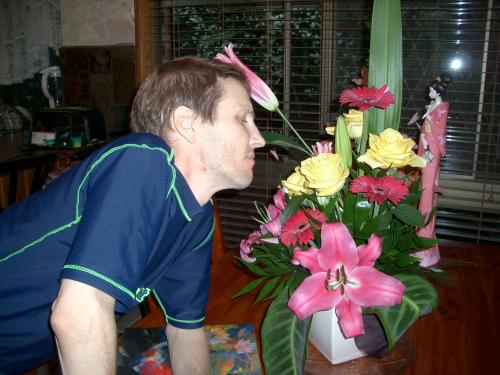
- Having an open policy on food cravings they have and drink requests - eg different kinds of cordials and variety of flavours. Whatever they want to be kept in the home ready for them - ours was flavoured porridge, farex, noodles, tacos, iceblocks and icecream etc - simple things that he still wanted to savour as eating and drinking ability fluctuated and subsided.
- Never being hurt when they are unable to eat or drink things that they may have requested. Just remembering that nothing tastes the same anymore and it's a memory of it that they are trying to relive, and often it does not occur. Its not your cooking, its just their taste buds.
- Everybody - no exceptions, wants to know that they will be remembered and live on in their loved ones hearts. Don't be afraid of this, embrace it - take photos and video's whenever you can.
- Don't wait until the person has died to create memorabilia about their life and their achievements. Do it for them while they are alive because then it is truly something that they get to share with you, in the memories that you have created. Create personalized photo albums (they have some great photo kiosks that do these now at a very inexpensive price), put their photo on cups, key rings, drink coasters, mouse pad, put together movies of their life, and anything you can think of, and give it to the patient!
- Write them poems and meaningful cards. It does not have to talk about your losing them, or them losing their lives, but be personal about their achievements, and memories that you have about them. Pride in them etc.

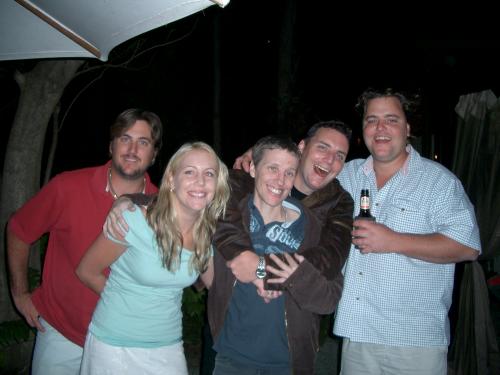
Leon, his sister and some of his brothers.
- Experience favourite hobbies with them, be it playing golf (while they are able) and then playing it on a game console with them when they are not.
- If they like playing cards, have poker nights, or karoke if they like to sing. Be involved in the day to day issues that their life is now experiencing and remembering it's their time, and your time to make it the best experience it can be for them, given whatever painful and emotional illness they have.
- Create lots of little goals. A lot of seemingly coincidental things will happen, however I am sure they are just part of the energy focus that everyone is placing on achieving happiness for the patient.
- Example for a male - Rugby league games and group betting pool of the scores, we took the same ones each way every week. Creates interest and anticipation to the final whistle. It was also getting together his old band and holding a gig on a property, fulfilling his dream of singing with his band one last time.
- We also bet on horses that had the word Lion in them, because that is the meaning of his name, and he experienced many episodes of great joy and fun when a rank outsider would come in and win him an amount of money. Or he would take $1.50 trifectas with 3 numbers that he just picked on a specific day - it was amazing how many exciting wins that he had this way, and they filled him with delight. Other goals we had, major cricket matches, tennis and golf tournaments, tv show final episodes, putting up the Christmas tree, Christmas eve and watching his son open his Christmas presents. After each goal was achieved it was noticeable to see a drop in exuberance or energy, and so we quickly endeavoured to find another goal or special occasion or memory to take its place. You buy time this way. My son gained 5 months against a one month prognosis.
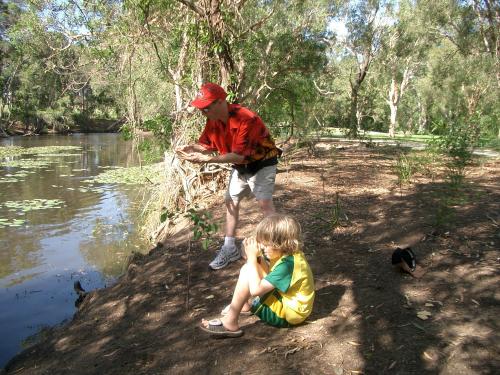
- Try to ascertain where their religious beliefs lie, whether they believe in God and help them to find peace within by visiting a church or a healing or bringing a pastor to the home to talk to them so that no opportunity is missed in ensuring your loved one chooses the path they want to go down in regard to a belief in the after life, and or redemption, forgiveness of sins and passage into Heaven. It has to be their choice though and nor forced.
- If they are not living with say children from a past relationship, ensure that you create continuing opportunities for the patient to spend quality time with their children, allowing them to choose their participation level, based on the stage of their illness. In our sons later stages, he chose the pool for his son and a warm spa as areas he and his son enjoyed that did not tax him heavily.
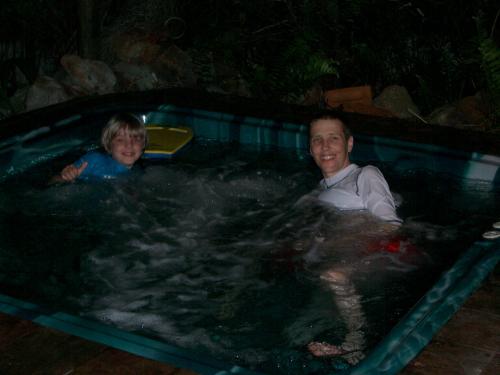
Leon and his son.
- Take every photo and video you can, it will actually reassure them of their place in your heart and your life and that you are creating further memories, perhaps as a legacy for their own children.

- Save every written note that you receive from them. Every mobile phone saved recording or text message, as you have no idea how they will help the family after wards. You kind of go through a period of not finding enough stuff to remember them by, which is just part of the grieving process.
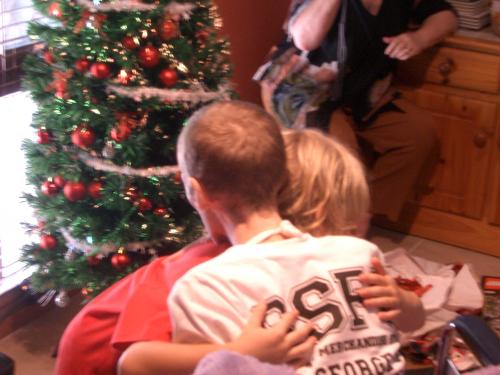
The final hug with his son.
- As their illness progresses, subtly arrange to have walking stick, walking frame, toilet chair and wheelchair accessible to you. The nursing palliative care team who will work with you, will help with identifying when its time to have these ready. It reduces the burden of feeling unprepared and ensures that as the loved one deteriorates they are comfortable that you will be able to continue to look after them in the home environment if that is what they and you have collectively agreed to.
- Supporting palliative care team will be able to assist with mattress's if the loved one prefers to stay in their own bed, or a hospital bed, reclining chairs, all the needs will be covered.
- At this stage, the carer will have likely become fully involved with administering medication to the loved one, whether it be via pills during the earlier stage or by pain relief patches. Towards the final stages generally a 24hour continuous morphine drip is used, and you may be required to inject breakthrough pain relief, into a little rubber node on the drip (not directly into the patient via the skin). This is not difficult, believe me, and the reassurance that it gives the patient is worth the little bit of discomfort and worry you may have initally. After you have done it a couple of times, it becomes simple and a day to day routine.
- Sleep deprivation for all parties living in the home will occur at times, however again, this can be simply fixed by the carer placing a mattress in the room of the patient, or if in a large bed actually sleeping in the room with them. If it's a mother with a child/adult child, this gives both some major comfort and can be a time of quiet grieving and personal talks between them. It's actually a time you can look back on and cherish as you know that if your loved one was in hospital they and you would never have this opportunity.
- When your loved one becomes wheelchair bound, arrange for some nice music to be placed in their room. They will at this stage have moved to watching tv or dvd's from there anyway, and then this will pass and they will drift in and out of sleep a lot more. The music is soothing and creates a gentle atmosphere, again something not able to be gained in a hospital.
- When they lapse into a coma prior to death, play this music constantly and frequently because although they cannot be roused, they can still hear as this is the last sense to go, and they will hear you talking to them also. This is a time to say all the things you might have found it to hard to say directly. Stay with the patient always, rotate family members around them and hold their hand as they will know you are there and it is the most ultimate gift of love you can give. It will give you solace afterwards.
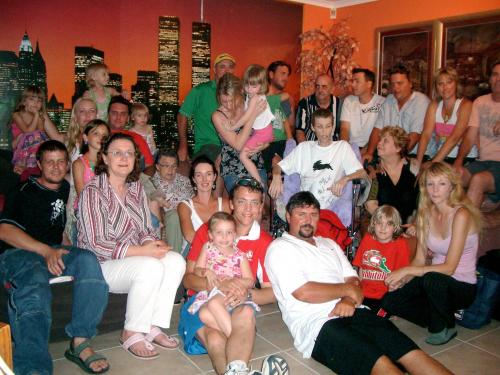
- Remember "treat your loved one as you would want to be treated, or treat them as they want to be treated". It is a true gift to nurse a loved one to their death.




